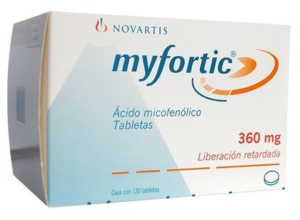Myfortic 360 mg Tablet Uses Benefits and Side Effects

Table of Contents
Myfortic 360 mg Tablet: A Comprehensive Guide
 In the world of medical advancements, organ transplantation has become a ray of hope for countless individuals suffering from life-threatening conditions. However, the success of transplantation heavily relies on the effectiveness of immunosuppressive medications, and one such medication that plays a crucial role in preventing organ rejection is Myfortic 360 mg Tablet. To fully understand the benefits and risks associated with Myfortic 360 mg Tablet, it’s essential to consult your healthcare provider. They will evaluate your specific medical condition and prescribe the most suitable treatment plan.
In the world of medical advancements, organ transplantation has become a ray of hope for countless individuals suffering from life-threatening conditions. However, the success of transplantation heavily relies on the effectiveness of immunosuppressive medications, and one such medication that plays a crucial role in preventing organ rejection is Myfortic 360 mg Tablet. To fully understand the benefits and risks associated with Myfortic 360 mg Tablet, it’s essential to consult your healthcare provider. They will evaluate your specific medical condition and prescribe the most suitable treatment plan.
Myfortic Tablet may interact with other medications you are taking. It’s crucial to inform your healthcare provider about all the drugs you use to prevent interactions that could affect your treatment’s efficacy. The dosage of Myfortic 360 mg Tablet may vary from patient to patient and depends on factors such as the type of organ transplant and individual medical history.
Store Myfortic in a cool, dry place, away from direct sunlight and moisture. Keep this medicine out of reach of children and follow the storage instructions. Before starting Myfortic, inform your healthcare provider about any existing medical conditions, allergies, or medications you are currently taking. They will assess risks and benefits and make an informed decision about your treatment.
Uses of Myfortic 360 mg Tablet
Prevention of Organ Rejection in Transplant Patients
Organ transplantation can be a life-saving procedure, but it comes with a significant challenge – the body’s immune system often recognizes the transplanted organ as a foreign invader and tries to reject it. This is where Myfortic 360 mg Tablet comes into play. Myfortic is an immunosuppressive medication that helps prevent organ rejection by suppressing the immune system’s response.
Benefits of Myfortic Tablet
Myfortic Tablet offers several benefits to transplant patients, including:
- Effective Rejection Prevention: Myfortic is specifically designed to target and inhibit the immune response responsible for organ rejection, increasing the chances of a successful transplant.
- Improved Quality of Life: By preventing organ rejection, Myfortic helps transplant recipients maintain a better quality of life without the constant threat of organ failure.
- Lower Risk of Infections: While suppressing the immune system, Myfortic also reduces the risk of infections that can be common after transplantation.
Side Effects of Myfortic Tablet
As with any medication, Myfortic Tablet may cause side effects. Common side effects include:
- Nausea
- Vomiting
- Diarrhea
- Decreased white blood cell count
- Bacterial infection
- Fungal infection
- Abdominal pain
- Breathlessness
- Increased creatinine level in blood
- Anemia
- Acne
- Muscle pain
- Headache
- High blood pressure
- Pneumonia
- Increased uric acid level in blood
- Electrolyte imbalance
- Anxiety
It’s important to consult your doctor if you experience severe or any side effects.
How to Use Myfortic Tablet
Using Myfortic 360 mg Tablet correctly is crucial for its effectiveness. Here are some guidelines:
- Take Myfortic as prescribed by your doctor.
- Swallow the tablet whole with water.
- Avoid crushing or breaking the tablet.
- Take Myfortic on an empty stomach or at least one hour before or two hours after meals for best results.
How Myfortic Tablet Works
Myfortic contains the active ingredient Mycophenolic Acid (MPA), which works by inhibiting the activity of specific immune cells that play a role in organ rejection. By doing so, Myfortic helps maintain the balance between the recipient’s immune system and the transplanted organ.


 Anti Cancer Drugs
Anti Cancer Drugs Hepatitis C
Hepatitis C Meds for HIV
Meds for HIV Ayurvedic Medicine
Ayurvedic Medicine Transplant Medicine
Transplant Medicine Respiratory System
Respiratory System +91-9999064250 / 9811604424 / 9811604444
+91-9999064250 / 9811604424 / 9811604444
 8(800)100-47-90
8(800)100-47-90
